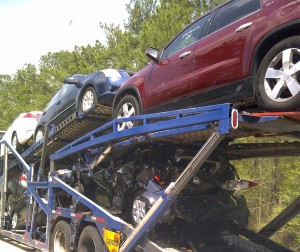The rail strike that crippled freight service across Canada and parts of the American Midwest has ended, but it has left automakers with a backlog of undelivered vehicles that could take weeks to unsnarl.
More than 4,000 employees of the Canadian Pacific Railroad are expected to return to work this week, clearing the way for shipments from assembly plants operated by General Motors Co., Ford Motor Co., Chrysler Group, Honda Motor Corp. and Toyota Motor Corp. in Southern Ontario and the Midwest where the railroad operates nearly 15,000 miles of track.
The impact of the strike varies by manufacturer, but shipping schedules have been thrown into disarray. Inbound freight – parts and components used on vehicle assembly lines — is delivered on a just-in-time schedule but outbound shipments of finished vehicles take weeks to complete and were already complicated in recent months by a shortage of car carriers. The situation could grow worse as a result of the strike.
The good news is that the walkout, which began on May 23rd, does not appear to have gone long enough to disrupt vehicle production schedules.
“We haven’t been impacted from a production perspective at this time,” said Chrysler spokeswoman Katie Hepler. “Our logistics team has worked hard with our transportation carriers to minimize any potential impact to customers, and now that back-to-work legislation has been introduced, we expect that rail operations will normalize shortly and remove any perceived uncertainty,” said GM spokeswoman Kelly Cusinato.
Nonetheless, the strike was estimated to have cost automakers $100,000 per day for each day without shipments, according to an industry association.
The Canadian government is using special legislation to force striking workers at Canadian Pacific Railway back onto the job. The goal of the legislation, which notes chances of a negotiated settlement appear remote, is to restore rail service by Thursday, according to the Canadian Minister of Labor.
Also noted was that the strike is costing the Canadian economy $530 million each week.
The rail dispute is only the latest in a string of labor disputes that have rippled across the Canadian economy recently. The government also intervened to stop strikes at Air Canada and the Canada Post.
Teamsters Canada, the union that struck the railroad, is vowing to continue its battle with Canadian Pacific’s management.
“We want the government to know how unhappy we are about the failed negotiations with CP,” explained Teamsters Canada vice-president and chief negotiator Doug Finnson. “The company is delighted the government is tabling back-to-work legislation this week. What they’re doing is outrageous,” he said.
Finnson insisted the railroad was never really interested in finding common ground. Instead, it dragged out the negotiations, relying on the promise that the government would step in and force CP workers, who have been off the job since last Wednesday, back to work.
“Unfortunately, critical issues are still unresolved,” lamented Finnson. “One is fatigue management, something the government should be very concerned about,” Finnson said.
“Fatigue for our members is a reality, not a figment of our imagination,” Teamsters vice-president said. “Is it too much to ask for our members to be able to sleep at home two days in a row, twice a month?”

